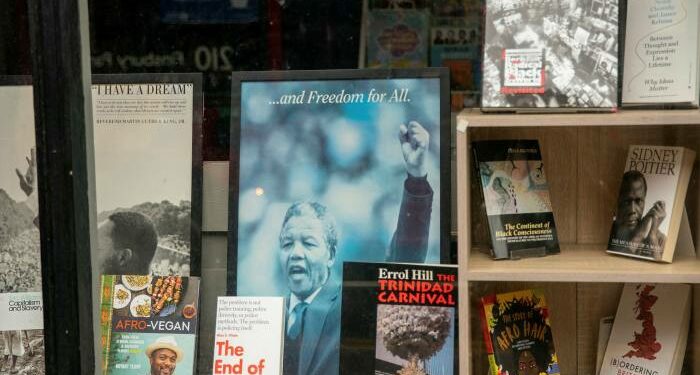When my grandfather died a few years ago, I inherited his library. The pages of the books I received had yellowed over time, their covers had creased but the titles themselves remained intact. For someone who left Jamaica as a teenager in order to serve the Mother Country in the second world war, and then spent his working life on the railways, his was an impressive collection.
There was from the beginning, my grandmother tells me, a bookish atmosphere in the home she made and shared with my grandfather for decades from 1960.
He read widely, with a focus on black history and literature: works by James Baldwin and CLR James; minor Caribbean novels alongside major tomes on ancient African kingdoms. Works he couldn’t buy on account of their publication date or price he sought out in libraries.
Like many immigrants, my grandfather saw books as a means of getting on in the world for his family. For himself, I think, reading was more about staying in touch with the Jamaica he left behind in 1944. So he would be cheered by the recent campaign that has guaranteed Britain’s oldest black bookshop, New Beacon Books, a future.
Based in north London since 1966, New Beacon’s stated mission has been to make available to the UK “books from Africa, [the] Caribbean, Asia, African America . . . and Black Britain”. But last December, the bookshop put out a call for funds, citing “a marked decrease in footfall” during the pandemic and the broader decline of independent retailers. It said it may have to close.
New Beacon is not the only black bookshop to have struggled. In April 2020, its US equivalent, Marcus Books in Oakland, California, launched a crowdfunding campaign in a bid to withstand the financial onslaught of Covid-19, as did City Lights in nearby San Francisco. Marcus Books has now comfortably surpassed its $200,000 goal. The shop has since 1975 hosted literary luminaries including Toni Morrison, Maya Angelou and Walter Mosley. Thanks to the generosity of the public, it can back new generations of writers.
The outpouring of support for these businesses from a loyal customer base and beyond is evidence of the vital role they play in their communities — and not just as retailers. Tulani Salahu-Din, from the National Museum of African American History and Culture, says African American bookstore owners have also been “activist entrepreneurs with the goal of educating and enlightening”.
In Philadelphia, Harriett’s Bookshop is named after Harriet Tubman, the celebrated “conductor” on the Underground Railroad that helped enslaved African Americans to escape into free states in the 19th century. It was opened in 2020 by Jeannine A Cook, who previously ran a street book stall. She says the impetus for a bricks-and-mortar shop spotlighting black women authors, artists and activists was that “everything starts with the word”. Some in the historically white neighbourhood of Fishtown were initially hostile and the pandemic hit hard — the business was too young to qualify for federal relief. Yet Harriett’s escaped the fate of many black-owned US businesses: last year the House of Representatives found Covid-19 pushed 41 per cent into closure from February to April 2020, widening the racial wealth gap.
In fact, Harriett’s was buoyed by conversations and commitments that followed the Black Lives Matter movement. Cook recalls “a huge influx of orders” throughout the summer of 2020, but also how neighbours formed a guard as pro-police demonstrators “yelled racial slurs right in front of the [door]”.
London’s New Beacon, which was similarly buoyed in 2020 by readers wanting to discover non-white writers afresh or for the first time, is now considering how best to use its influx of funds amid the ever-larger market role occupied by digital platforms. One possibility is the revival of its publishing arm — in a return to its founders’ conception of a business that would give an “independent validation to one’s own culture”.
Whatever the future holds, the success of its crowdfunding is a shot in the arm for multiculturalism. It also ensures the books my grandfather cherished will continue to be enjoyed by a new generation of readers.











